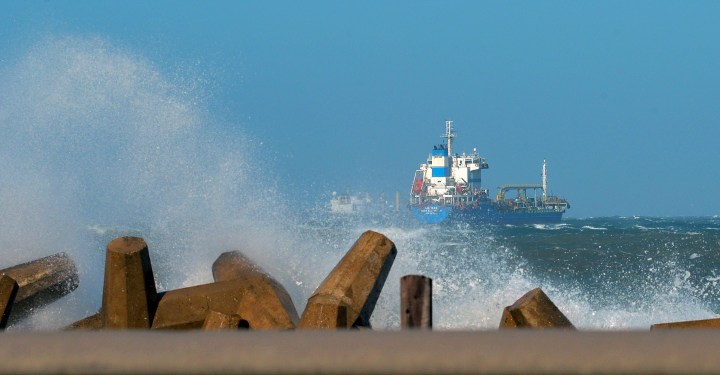ISS TODAY OP-ED
Africa’s youth forced to weather the brunt of rising climate threat to coastal communities

Given fast-growing coastal populations, African youth should be the focus of climate adaptation efforts and the blue economy.
Africa is highly dependent on its fishing value chains, with fish providing 30% of animal protein in people’s diets. Research from WorldFish indicates that in a business-as-usual scenario, this industry will employ 21.6 million Africans and generate an income of $3.3-billion by 2050. In the plausible high-growth scenario, the numbers jump to 50.8 million jobs and revenue of $20.4-billion.
But all of this is under threat as climate change wreaks devastation on Africa’s fishing industry and coastal communities. As sea levels rise and climatic conditions such as acidification affect ocean health, the livelihoods of those who live along the shoreline are at stake.
Disaster risk reduction measures are needed fast to mitigate these impacts and their threat to human security. And by focusing on working-age youth to implement these measures, an imminent crisis can become an opportunity to mitigate climate disaster and generate a demographic dividend.
Climate change is forcing coastal communities to deal with hotter oceans and rising sea levels — both of which could have catastrophic consequences if not curbed. Sea temperatures have surged almost 1oC above the 1971-2000 average. The effects of warmer waters are apparent with high-energy storms like Cyclone Freddy, which devastated Southern Africa, and Storm Daniel, which ravaged Derna in Libya.
Read more in Daily Maverick: Cyclone Freddy’s deadly trail of destruction a grim reminder of the need to prioritise climate adaptation
Water levels have risen globally by 21-24 cm compared to 1880. In the latest scenarios, if the temperature increase is restricted to 1.5oC, the sea level rise in 2100 will be 28-55 cm. Further delays to ending the use of fossil fuels might land us in a +4.4oC world by 2100 — with a sea level rise of 63-101 cm.
Such levels would compromise most of Africa’s coastal towns and cities, with devastating effects on island states like Mauritius, the Comoros and Seychelles. Apart from drowning out coastal settlements and developments, saltwater intrusion on freshwater resources would drastically reduce water security and compromise coastal crops and livestock farming. This is already happening on the island of Nyangai off the coast of Sierra Leone. High-value infrastructure would also be threatened in more developed cities, with severe development impacts.
Rapidly growing populations
Africa’s population will grow by 27% this decade. It will be higher in coastal cities, with the seven largest — Lagos, Luanda, Dar es Salaam, Alexandria, Abidjan, Cape Town and Casablanca — growing by 40% in the same period. These increases are being fuelled by the economic importance of coastal cities.
At the same time, the continent’s blue economy, including ports, fisheries, tourism and other coastal activities, is expected to grow significantly. World Bank estimates suggest an expansion from $296-billion in 2018 to $405-billion by 2030. African governments recognise this potential — the continent’s Blue Economy Strategy and Great Blue Wall initiative were actively reinforced at an African Union meeting in June last year.
Africa’s growing population is young, with 40% aged 15 or less in 2022, and an average age of 20. This demographic trend is crucial in understanding the disproportionate impact of climate change on the youth.
As coastal cities experience rapid population growth, young people’s vulnerability to climate change intensifies, especially those dependent on agriculture and fishing. Climate change will severely jeopardise their employment opportunities, with a loss of livelihoods leading to multi-generational poverty.
Crime rates could rise as people search for alternative sources of income, and climate-induced displacement and economic hardship will create fertile ground for radicalisation and violent extremism, adding to insecurity in coastal communities.
Forced mobility is another potential problem. Rising sea levels and environmental degradation will compel young people to migrate further into and outside the continent, often facing perilous journeys and uncertain futures.
Intersectional factors such as age, gender and socio-economic status exacerbate risks for marginalised youth. Young women in the blue economy often encounter additional obstacles in accessing education or employment, compounding their vulnerability to the impacts of climate change and their ability to adapt. Examining these intersecting challenges is essential to address the unique needs of marginalised youth in coastal Africa and to scale up indigenous, innovative adaptation measures.
Studies show that the emergence of piracy in Somalia was multifaceted, driven not just by poverty and the lure of fast money, but by a resistance to foreign fleets exploiting marine resources. Climate change will exacerbate such pressures. In Somalia’s case, the ocean economy is pivotal to the country’s stability. However significant reductions in fisheries due to climate change and natural ecosystem variability threaten food security and income generation in a region already facing insecurity.
Africa’s coastal resources hold tremendous potential for sustainable development driven by the continent’s youthful population. A focus on tackling the climate crisis could present an opportunity for young people to take the lead in building resilient coastal communities for the future. DM
Dhesigen Naidoo, Senior Research Associate, Climate and David Willima, Research Officer, Maritime, Institute for Security Studies (ISS) Pretoria.
First published by ISS Today.



















 Become an Insider
Become an Insider
Comments - Please login in order to comment.